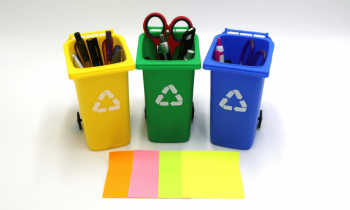What’s the one thing you would change about your pupils?
I have asked teachers this question many times. By far the most common response I hear is a variation on the following theme:
- ‘I want my pupils to be more independent.’
- ‘I want them to be less apathetic/needy/helpless.’
- ‘I wish I didn’t have to spoon-feed them all the time.’
To explore the scale of the problem, I recently asked Twitter: ‘What’s the most helpless question a child has asked you?’ I was inundated with replies:
- ‘Should I sharpen my (very blunt) pencil?’
- ‘I’ve done question one, what should I do now?’
- ‘Where shall I put the rubbish?’
At this point, a number of questions arise. Is it possible to teach children in such a way that they are less likely to weigh down their teachers with such helpless utterances? Is it possible to teach children to become more confident, proactive, self-regulated learners? Put simply: is it possible to teach children how to get better at learning independently?
Raising the bar, closing the gap
Ten years ago, a small team of teachers set out to create a curriculum to achieve just this. I know because I was one of them. We developed something called the Learning Skills curriculum, and I evaluated it over eight years as the focus of my PhD with the University of Cambridge. That evaluation found that Learning Skills led to significant gains in subject learning across the curriculum, with accelerated gains among children from disadvantaged backgrounds (Mannion & Mercer, 2016; Mannion, McAllister & Mercer, 2018).
Learning Skills was developed in a secondary school, but it is really a universal set of ideas and practices that can help anyone – adult, teen or toddler – become a more effective learner. The approach is already taking root and bearing fruit across a range of contexts: from reception classes to universities, from schools in deprived areas to elite international colleges, from workplaces to refugee camps. Although we adapt the methods we use when working with different age groups and in different settings, the underlying approach is fundamentally the same.
Learning to Learn in the primary setting
Teaching children how to get better at learning independently is a complex problem – it is simultaneously cognitive, social/emotional and behavioural. We therefore need to approach this complex problem with what I refer to as a ‘complex intervention’ – an intervention with many moving parts.
Research suggests that three key concepts are particularly important when teaching children how to get better at learning.
- Metacognition – monitoring and controlling thought processes (their internal environment).
- Self-regulation – monitoring and controlling feelings (physical and emotional) and behaviours (how they interact with the external environment).
- Oracy – speaking and listening effectively in a range of contexts.
Separately, these are really effective things to focus on. Taken together, the ‘marginal gains’ to arise from each element stack up and interact to become a powerful, self-actualising force that is greater than the sum of its parts.
I recently co-authored a book, ‘Fear is the Mind Killer: Why Learning to Learn deserves lesson time – and how to make it work for you pupils’, with my amazing colleague Kate McAllister, who is currently setting up a school in the Dominican Republic to put these ideas into action for children aged four to 14. The book contains lots of practical guidance on how schools can implement these ideas. In the remainder of this article, I will share a few examples of powerful practices that we used to help our students become more confident, proactive, self-regulated learners.
Metacognition
The how of learning
The key to learning to learn is to focus on the ‘how’ as well as the ‘what’ of learning. Find ways to make the invisible, tacit, implicit processes of learning visible, tangible, explicit – and therefore learnable.
Learning Journals
Once a week, ask your pupils to write a few lines. Look back at the previous week: what went well? What challenges did you encounter? What could you have done differently? And look forward: set some goals for the coming week, to review next time.
Self-regulation
Project-based learning
It needs to be planned very carefully, but project-based learning is really important in developing self-regulated learners. It allows the teacher to step back and the child to discover what they can and cannot do by themselves, in the absence of supervision. At first, some will struggle, but they need the time and space to develop the ability to stand on their own two feet.
Curated autonomy
Find ways to allow the children to exercise choice over their learning. This should be curated, rather than a free-for-all. Allow them to set their own homework, or to choose how to present their work, or what aspect of a topic they want to explore in more depth as the focus of a project.
Oracy
Talk rules
This is the most powerful thing I ever did as a teacher. There isn’t space to explain it fully here. Visit the University of Cambridge Thinking Together website for some excellent resources to help you get started.
Presentational talk
Even very young children can learn how to stand at the front of a room and deliver a knockout speech with no notes. When they do, they walk an inch taller. They find their voice physically and metaphorically. They start to see themselves differently. It makes them confident and this is perhaps the most valuable gift of them all.
I do not want schools to take our ideas off the peg and implement them in a top-down way: this approach is almost certainly destined to fail. Instead, we work with schools to help them develop their own complex intervention, one that is suited to your particular teachers and your particular children, at this particular point in time. If you would like to find out more, drop me a line at rethinking-ed.org/contact. I look forward to hearing from you.
Here’s what to do
- Put together a ‘vertical slice team’ to decide how to move forward with this agenda. A cross-section of the organisation: a senior leader, a middle leader, teachers from each key stage, teaching assistant, a learning support assistant, the Special Educational Needs Coordinator.
- Make sure all teachers understand the theory, once they know this, they can apply these ideas from first principles: Metacognition: monitoring and controlling thought processes; Self-regulation: monitoring and controlling feelings and behaviours; Oracy: speaking and listening effectively in a range of contexts.
- As a rule of thumb, find ways to make the invisible, tacit, implicit processes of learning visible, tangible, explicit – and therefore learnable.
- Start small and build a ‘complex intervention’ that works for your teachers and your children, at this particular point in time.
Dr James Mannion, worked as a Science teacher for 12 years, and spent eight years in school leadership roles. He has an MA in person-centred education from the University of Sussex, and a PhD in Learning to Learn from the University of Cambridge. He is a Bespoke Programmes Leader at the UCL Institute of Education, an Associate of Oracy Cambridge, and a Fellow of the Chartered College of Teaching. To learn more or order a copy of Fear is the Mind Killer by Dr James Mannion and Kate McAllister (priced at just £13), please click here.










